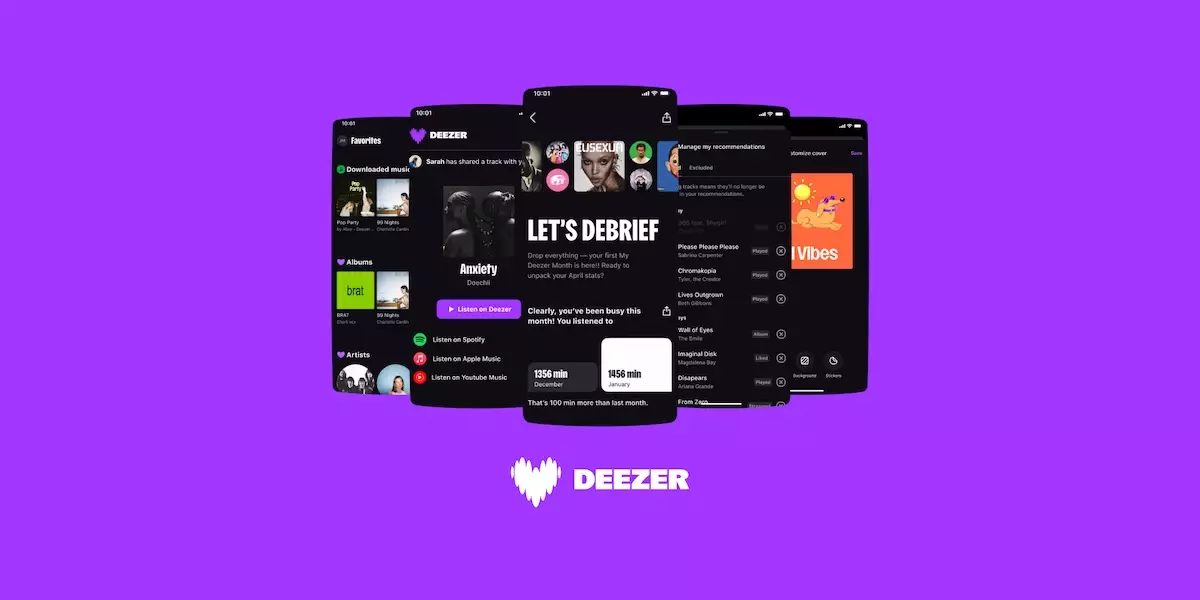In a remarkable turn of events, Deezer, the music streaming giant, recently reported its first positive cash flow in 2024, marking a pivotal moment in its evolution. As the competitive landscape of music streaming continues to expand, filled with powerhouses like Spotify, Apple Music, and Amazon Music, Deezer is strategically positioning itself on the pathway to profitability. This financial turnaround comes as the platform embarks on the launch of innovative features aimed specifically at enhancing user experience through personalization.
Taking Personalization to New Heights
One of the most exciting aspects of Deezer’s recent updates is the focus on personalization. The introduction of a customizable algorithm stands out as a game changer; allowing users to tailor their music experience profoundly. This goes beyond what competitors offer—while other platforms offer basic functions like disliking songs, Deezer enables users to exclude specific tracks, albums, or even artists entirely from their recommendations. This level of control promises to empower listeners, making their music discovery process feel more intuitive and fulfilling.
Introducing the “Manage My Recommendations” section, users now possess remarkable power over the content they encounter. This evolution addresses a common pain point among streaming users: irrelevant suggestions. By providing tools that allow constituents to dictate their favorite sounds actively, Deezer is positioning itself not merely as a music platform but as a personalized auditory companion.
Enhancing User Interaction with Dislike Features
Accompanying the customizable algorithm is the addition of a “dislike” feature—a simplistic yet impactful innovation. By allowing users to communicate disapproval through an easily recognizable symbol, Deezer bridges the gap between passive consumption and active engagement. This addition pairs effectively with the existing “like” feature, fostering a deeper interaction with the overall listening experience.
Such features reveal Deezer’s understanding that in today’s fast-paced digital world, relevancy is everything. Listeners shouldn’t have to be bombarded with tracks they’re not interested in; instead, they should feel treated to an experience intentionally curated for them. This approach not only enhances user satisfaction but also sets a higher standard for engagement in the streaming industry.
A Leap into Monthly Recaps
Venturing into a highly competitive area of music streaming, Deezer introduced “My Deezer Month,” a monthly recap feature designed to provide listeners with insights into their listening habits. This feature mimics the successful annual wrap-up, “My Deezer Year,” yet aims to offer a more granular view of user activity through statistics that monitor trends on a month-to-month cadence. While Spotify has enjoyed the lion’s share of this genre of features, Deezer’s attempt to capture this audience demonstrates bold ambition.
However, competing with industry titans raises questions regarding Deezer’s market seizure competency. Will it reach the levels seen in Spotify’s user engagement, or catch the eye of listeners who have become accustomed to familiar formats? The success of these features will ultimately hinge on Deezer’s ability to provide insightful statistics that resonate with the listener’s interests and encourage continual engagement.
The Universal Sharing Feature: Breaking Barriers
In addition to personalization, Deezer introduced a universal sharing feature that invites broader interaction beyond its platform. This innovative step allows users to share tracks with friends who may not have a Deezer subscription, driving inclusivity and expanding Deezer’s reach. When a user shares a song, recipients are directed to a versatile interface enabling them to access the song on their platform of choice, be it Spotify, Apple Music, or Deezer itself.
By embracing universal sharing, Deezer acknowledges that music transcends platforms—it’s about bringing people together regardless of their preferred services. This feature could effectively broaden Deezer’s user base and create opportunities for new listeners to discover their music catalog without barriers.
The Challenge Ahead: Subscriber Growth and Market Positioning
Despite its recent financial progress, Deezer is grappling with a decline in subscribers, dropping from 10 million to 9.7 million in just a year. With Spotify leading the pack in terms of user engagement and overall numbers, standing out in such a crowded market is crucial. Deezer’s innovative features may just be the catalyst it needs to turn the tide.
As Deezer approaches a significant leap in its business evolution, the question remains—can an emphasis on personalization, user engagement, and cross-platform sharing redefine its market position amid heavy competition? Only time will tell if these ambitious efforts will lead to sustainable growth.

